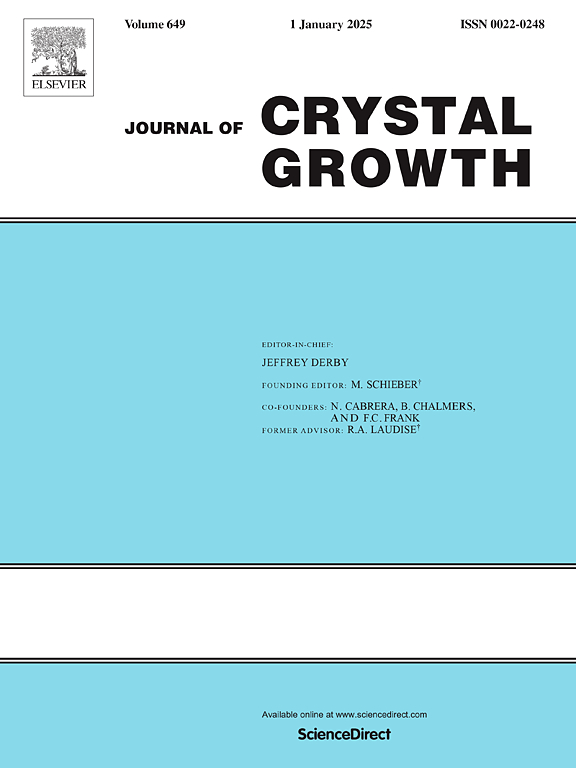水热法 PPKTP 制备及其自发参数下转换特性
IF 1.7
4区 材料科学
Q3 CRYSTALLOGRAPHY
引用次数: 0
摘要
采用高压电场极化、选择性腐蚀、电流监测等方法研制水热法PPKTP。研究发现,在高压电场极化过程中,水热法生长的 KTP 晶体的反转域成核具有四种微观形态,即条状、纺锤状、子弹状和不规则状。与通量生长的 KTP 晶体极化过程中的漏电流相比,水热生长的 KTP 晶体只有在外加电场远大于矫顽力场时才存在漏电流。通过多次加载短脉冲可以抑制漏电流,并分别制备出了极化周期为 10 μm 和 46 μm 的 PPKTP。随后,以制作的 PPKTP 为基础,对 SPDC 特性进行了研究。对于极化周期为 10 μm 的 PPKTP,利用 SPDC 技术制备了亮度超过 2.1 kHz @ 810 nm 的量子纠缠源。否则,使用极化周期为 46 μm 的 PPKTP 进行 SPDC,通道 1 和通道 2 中纠缠光子对的亮度分别为 3.21 kHz @ 1560 nm 和 5.31 kHz @ 1560 nm。本文章由计算机程序翻译,如有差异,请以英文原文为准。
Fabrication of hydrothermal PPKTP and its spontaneous parametric down-conversion characteristics
High-voltage electric field polarization, selective corrosion, current monitoring, and other methods are used to develop hydrothermal PPKTP. It is found that the reversal domain nucleation of hydrothermal-grown KTP crystals has four kinds of microscopic morphology, namely, strip shape, spindle shape, bullet shape and irregular shape, in the process of high voltage electric field polarization. Compared with the leakage current in the process of polarization of flux-grown KTP crystals, the hydrothermal-grown KTP crystals only exist when the applied electric field is much larger than the coercive field. The leakage current can be suppressed by multiple loading of short pulses, and the PPKTP with a poled period of 10 μm and 46 μm were fabricated, respectively. Subsequently, based on the fabricated PPKTP, the SPDC characteristics are studied. To the PPKTP with a poled period of 10 μm, the quantum entanglement source whose brightness exceeds 2.1 kHz @ 810 nm is prepared by the SPDC technique. Otherwise, the PPKTP with a poled period of 46 μm is used for SPDC, and the brightness of entangled photon pairs in channel 1 and channel 2 are 3.21 kHz @ 1560 nm and 5.31 kHz @ 1560 nm, respectively.
求助全文
通过发布文献求助,成功后即可免费获取论文全文。
去求助
来源期刊

Journal of Crystal Growth
化学-晶体学
CiteScore
3.60
自引率
11.10%
发文量
373
审稿时长
65 days
期刊介绍:
The journal offers a common reference and publication source for workers engaged in research on the experimental and theoretical aspects of crystal growth and its applications, e.g. in devices. Experimental and theoretical contributions are published in the following fields: theory of nucleation and growth, molecular kinetics and transport phenomena, crystallization in viscous media such as polymers and glasses; crystal growth of metals, minerals, semiconductors, superconductors, magnetics, inorganic, organic and biological substances in bulk or as thin films; molecular beam epitaxy, chemical vapor deposition, growth of III-V and II-VI and other semiconductors; characterization of single crystals by physical and chemical methods; apparatus, instrumentation and techniques for crystal growth, and purification methods; multilayer heterostructures and their characterisation with an emphasis on crystal growth and epitaxial aspects of electronic materials. A special feature of the journal is the periodic inclusion of proceedings of symposia and conferences on relevant aspects of crystal growth.
 求助内容:
求助内容: 应助结果提醒方式:
应助结果提醒方式:


